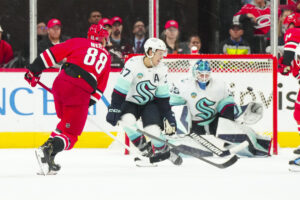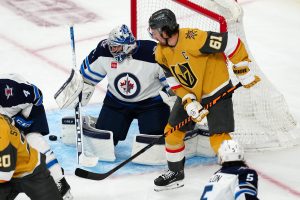It isn’t often one gets to criticize an entire ecosystem. And use words like lazy, cowardly and incompetent. However, it is happening in this four-piece series. By the time we conclude this series on NHL Playoff Officiating and Player Safety, we’ll see how the lack of accountability at multiple levels in the NHL ecosystem is hurting the game itself.
People watched the Stanley Cup playoffs and noticed the questionable officiating. There are many takes on the officiating and this one is far from the norm. Indeed, the problems are not one bad call here or one misunderstood call there, but symptoms of issues which merit respectful investigation. The problem is the NHL and it’s ecosystem seems allergic to actually investigating. The result is a system that is broken from the league’s executive suite to player safety to the mainstream NHL media.
All are culpable for a dysfunctional system.
The Viewpoint
Since my beat is the San Jose Sharks, I’ve seen and investigated the controversial calls involved in their playoff run. Three items are covered, including two of the most discussed calls of the playoffs, along with a series of calls that have gotten minimal visibility despite their importance to the game.
Since the conclusions differ from most, the review of the material in these articles has been meticulous.
The subject will be covered over four articles. This article will examine head hits over multiple games while the second article will cover the injury to Joe Pavelski in Game 7 of the series against the Vegas Golden Knights. The third article will look at the hand pass non-call which ended Game 3 in the series against the St. Louis Blues. The fourth will look at the lessons each case gives us and draw some conclusions not merely about the state of officiating, but of the entire NHL ecosystem around officiating and player safety.
A few housekeeping notes before diving in. I’ve always been aggressive on player safety issues, going beyond many of the usual critics (I argued for banning Raffi Torres, for getting better facial protection for players, etc.).
In terms of the on-ice events, all of it is visible from game action using official network broadcasts. In some cases, a ‘freeze-frame’ presents a clear view and when appropriate, it will be noted. The broadcasts used were the NBCSN broadcast for the Sharks-Knights series and the NBC national broadcast for the Sharks-Blues series.
The articles invite ancillary debates, including on-ice culture, targeting players and so forth. These are important arguments, but not the focus of these pieces.
Head Hits
If there is one area that left Sharks fans livid during the recent playoffs, it was the head hits the Sharks absorbed in the playoffs. NHL commissioner Gary Bettman’s “head exploding” comment over a hand pass went over especially poorly with a fan base who’d seen opponents exploding into the heads of their team’s players. For the record, it wasn’t merely the fans who were frustrated.
Justin Braun took a hard head hit in Game 3 of the series with the Blues. The Blues targeted Braun. For the most part, the hits were clean, but there was one glaring exception. Sharks head coach Peter DeBoer commented on the hit. This was noteworthy because DeBoer is reluctant to mention anything officiating-related beyond the standard fare of ‘it’s a tough job’. Braun was also hit hard in the head in the series against the Golden Knights. A head hit on Tomas Hertl in Game 5 against the Blues is another which stands out – Hertl’s teammate Marc-Edouard Vlasic made his feelings known on this hit. Logan Couture expressed his view that non-calls and lack of league action led to more of the same while former Sharks player Devin Setoguchi aired his frustration by pointing out both enforcement inconsistencies and a lack of media understanding.
For all the head hits against Sharks players, these three stand out as particularly egregious. There was not a single penalty, fine or suspension against any of the players who made the hits. Once again, this is a story that has gone missing in the media outside of San Jose. The lone head hit in any of the Sharks playoff games which did get a response was Joe Thornton’s hit on Tomas Nosek of the Golden Knights. Thornton got a minor penalty (it deserved a major) and a one-game suspension (also deserved).
Peeling Back the NHL Layers of Defence Against Head Hits
There is a problem with the on-ice officials either missing or ignoring these head hits. On two of the three head hits, videos show officials appear to be looking at the play. They are the first layer of defence when it comes to player safety. If players know, with certainty, they’ll get a penalty (possibly a major) for a head hit, they are less likely to make the hit. On these three egregious calls, the officials were 0-for-3.
There is a second layer of player safety which also failed completely and no one seemed to care. When a head hit occurs, there is personnel required to act as part of the NHL’s protocol. Among them are In-Arena Spotters and Central League Spotters. These spotters are supposed to determine if the player should be evaluated for a concussion.
On none of the above hits did this occur. Hertl returned to play his next shift, though he’d later leave the game with a concussion (and miss the following game, too). Braun left the game immediately after the head hit against the Blues, even though the play was active in the Sharks defensive zone. He knew he was hurt (even leaving gear behind when he left the ice) but that wasn’t enough for the spotters. Braun also returned to the game for his next shift. In the game against the Golden Knights, Braun also went to the bench after the head hit and returned for his next shift. The spotters were 0/3.
Head Hits and Concussion Evaluations
When NHL officials call a penalty on a head hit, it is far more likely a concussion evaluation takes place. Play stops and the people involved in the process can get a better look at what happened. In Hertl’s case, play actually did stop, though not for a penalty. It stopped because Hertl was down on the ice. Hertl went to the bench and play resumed. If a head hit is called by the officials on the ice, it is more likely the spotters will act.
In the three head hits cited, the spotters’ failure to put these Sharks players immediately into the appropriate concussion evaluation is indefensible. Absolutely indefensible.
NHL Playoff Officiating and Sharks Responsibility
The Sharks are on the culpable list here, too. Teams have a formal responsibility to put a player into the concussion evaluation protocol if they see or believe something warrants it.
One can offer up excuses for a team missing a head hit during play. The view from the team bench is often not as good as can be seen from higher up or on video. Nor is it the prime responsibility of the people on the bench to look for these.
Still, few teams would take a player off the ice voluntarily, especially in a playoff game, even if they noticed a head hit. It is a ‘fox guarding the henhouse’ issue. For example, Jake DeBrusk of the Boston Bruins played nearly the entire Stanley Cup playoffs while dealing with concussion issues.
Don’t buy any excuses. The Sharks also failed in this area, especially on the Hertl hit which happened near center ice in full view of the bench. The Sharks, too, were 0-for-3.
Player Safety and the NHL Media Responsibility
The next layer of the responsibility belongs to the NHL Department of Player Safety who can dole out discipline for head hits. They took no action on any of these hits. Another 0-for-3.
Sharks fans were livid on these missed calls, but there is more to the story. The NHL’s system designed to protect players from head hits missed out on protecting players 12 times out of 12. Which is absurdly bad in any league.
Yet another layer exists which can create accountability. This is the mainstream NHL media. By covering these systematic failures, the media can essentially spur (or perhaps shame) the league into doing better. The media failed as well.
What is missing? Accountability. The NHL Playoff officials failed. Those who noticed the head hits usually stopped here. But the spotters also failed, the Sharks also failed, NHL player safety also failed. The NHL media ecosystem, the last arm of accountability, was AWOL on all this. All in all, five layers of failure.
The system is broken.
Main Photo for NHL Playoff Officiating:
ST LOUIS, MISSOURI – MAY 15: Matt MacPherson #83, linesman Jonny Murray #95 and referee Dan O’Rourke #9 discuss a possible hand pass call between the San Jose Sharks and the St. Louis Blues in overtime in Game Three of the Western Conference Finals during the 2019 NHL Stanley Cup Playoffs at Enterprise Center on May 15, 2019 in St Louis, Missouri. (Photo by Elsa/Getty Images)






